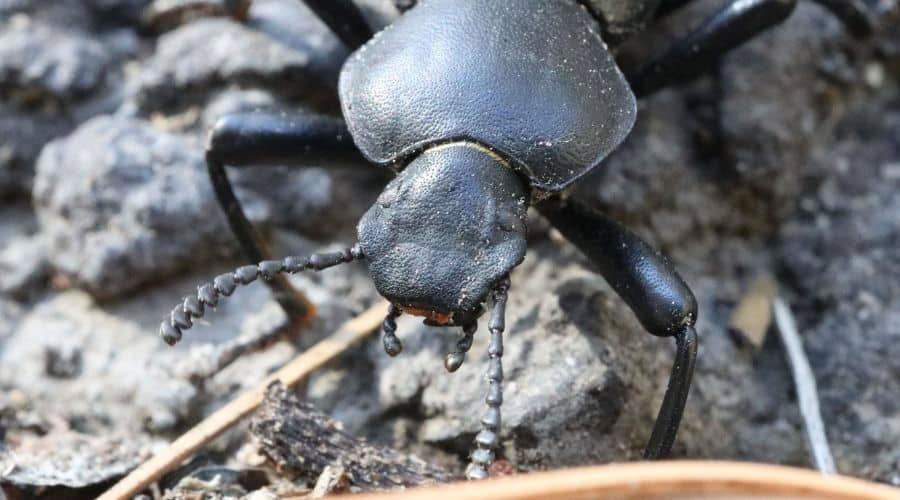Darkling beetles are more likely to run away or threaten to stink bomb you than to bite, but they do have mandibles. Depending on the species and age of the Darkling, the size of its mandibles will vary.
Resultantly, some are too small to really get ahold of your skin, while others have a large and nasty pinch. Do darling beetles bite?
Darkling beetles don’t bite and are completely harmless to humans. Instead of teeth, a Darkling beetle’s mouth has mandibles, which are pincers designed to grab and chew food outside the mouth, and then move it inward. Their defense mechanism is running, hiding, burrowing, or spraying chemicals out of their backside.
Table of Contents
Darkling Beetle Bite
Darkling beetles bite all day. Using their mandibles, they chew through all manner of organic material. These myriad insects are vital to the ecological system, from plants to rotting animals. However, they are not usually hunters, nor are they aggressive.
The majority of bites come from accidentally startling them, and even then, it’s rare for a larger animal or human to get bitten by a beetle.
Some people mistake the pokey or sticky and grasping feeling of beetle feet for small bites.
While these can be alarming, they aren’t dangerous, and most of the time, if a beetle is on your skin, you’re only feeling the tiny hairs they use to hold on as they walk.
Sadly, there’s a lot of confusion surrounding Darkling beetle bites. On the one hand, there are credible reports such as the Carolina Biological Darkling Beetle Data Report that says a Darkling cannot bit you and add that the only defense these insects have is to spray you with a “mildly offensive” odor.
However, that same report also says they are indigenous to South and Central America. The information isn’t wrong, but it is unnecessarily limited and doesn’t include other species of Darklings. It’s probably only addressing one species of Darklings found in that region.
Alternatively, the Entomology Graduate Student Association at the University of California, Riverside says, “The term “darkling beetle” refers to several genera within the insect family Tenebrionidae which include about 20,000 species. They can also be referred to as “pinacate beetles.” They are found worldwide but are most commonly encountered in the deserts of the western United States, with as many as 450 species in California alone…They don’t usually bite when bothered and can be conditioned to handling by humans.”
Clearly, this specialist group disagrees with the first about their habitat and the beetle’s ability to bite.
Do Darkling Beetles Bite Humans
The difference between what a species can do and what they usually do is often a fin distinction.
However, with thousands of species falling under the umbrella term ‘Darkling beetle,’ some are bound to be more aggressive than others. That said, Darkling beetles do not usually bite humans.
Many Darkling beetles are mistaken for their more dangerous cousins the blister beetles. If you get nipped by a blister beetle, you’ll know because their toxin will cause your skin to blister up and be painful.
However, these are not members of the Darkling family despite their similar appearance.
A Darkling beetle’s mouth has mandibles, which are pincers designed to grab and chew food outside the mouth, and then move it inward.
However, the way many of these species are built makes it difficult for them to grasp or damage a human.
What Happens If A Darkling Beetle Bites You
If a Darkling beetle bites you, it’s because you scared it. Most likely the only thing that will happen is that you will feel a slight pinch. Some species can’t even break the skin, but others could make you bleed a tiny bit if they really tried.
Since Darklings have no known toxins, there’s nothing special to worry about. However, their diet doesn’t leave them with the cleanest mandibles.
You should probably wash your hands, especially if they broke the skin, because you never know what the beetle’s last meal was. It could have eaten carrion, but regardless, a little common-sense hygiene is always the right choice.
Do All Darkling Beetles Bite
All Darkling beetles can bite what fits inside their mouths. However, not all species of Darklings are large enough to fit any part of you in their miniature mouthparts.
If you were a mealworm, then you might have something to worry about, but as a human, only some of the tens of thousands of species of Darklings have sizeable enough mandibles to nip at you, and they still probably won’t so long as you don’t give them a good reason.
What To Do About A Darkling Beetle Bite
If a Darkling beetle bites you, put it down, or move your hand. You’ve frightened the poor thing seriously. Some people laugh, others squish the bug, but in general, there’s no requirement for what to do if a Darkling beetle bites you.
The bites are so small you won’t even need a bandage. That said, I do recommend washing your hands.
I haven’t found any diseases that these types of beetles spread to humans, but their tiny mouths aren’t exactly sanitary.
Plus, they can carry some diseases that spread to chickens and other animals, so a bit of antibacterial soap and water makes sense. Beyond that, you should be fine.
Helpful Tips To Know If Darkling Beetles Bite
Anything with a mouth that opens and shuts can bite, including Darkling beetles. However, the bite is limited by the relative jaw strength and what fits between the beetle’s pincers. Your finger, for example, probably isn’t on the menu.
Here are more helpful tips to know do Darkling beetles bite.
- Darkling beetles may not be a big problem when they bite people, but they can do a lot of damage with their mouths regardless. When beetles start chewing off newly grown plants or get into your house insulation, their bites are a menace.
- Oddly, some Darkling beetles may be able to eat and process styrofoam, which otherwise lasts forever. That means these garden menaces can direct their energy and their bites toward doing some good for the planet.
- If you find Darkling beetles in your poultry house, get rid of them right away. They typically won’t bite your chickens, but they can carry Infectious Bursal Disease Virus (IBDV), Marek’s Disease Virus (MDV), and Reovirus, which are all bad news for birds.
Final Thoughts
Use common sense. Remember to wear gloves if you plan to handle wild insects and flip over rocks with the toe of your shoe instead of your bare fingers.
Still, the chances of getting bitten by a Darkling beetle are so slim it’s almost impossible. Darkling beetles live to break down organic matter.
As scavengers and decomposers, they fulfill a vital ecological niche, but they aren’t hunters. It’s rare for a Darkling to eat or bite anything living except for mealworms who sometimes cannibalize their younger larval cousins upon emerging from the pupa as a newly formed adult beetle.
As for humans, you shouldn’t worry too much about getting bitten by these beetles. Even if one does pinch you, it most likely won’t break the skin, and they have no toxins to speak of. Handwashing should take care of any germs.

